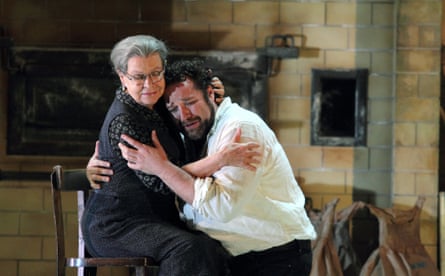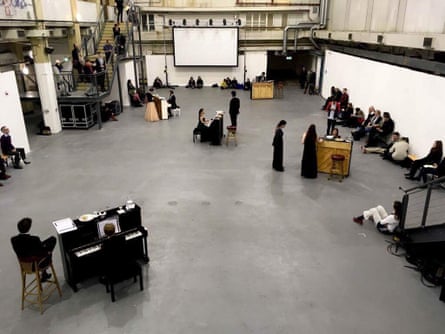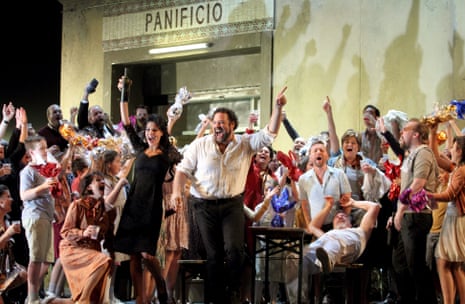True hatred, true love. This double emotional punch is promised in the prologue to Leoncavallo’s Pagliacci, half of the traditional Cav & Pag double bill, which is this year’s festive offering from the Royal Opera in Damiano Michieletto’s 2015 staging. Festive, that is, in holding up a mirror to family life in all its psychic gore, knife ready to plunge, tears to spill, yet transformed into a shred of seasonal hope via the binding agent of passionate melody.
Pagliacci (1892), based on a newspaper crime report, tells of a group of travelling players whose internecine love quarrel acts itself out on stage, a Noises Off minus the jokes. The partner work, Mascagni’s Cavalleria rusticana, taken from the Sicilian realist writer Giovanni Verga, is yet more glum: southern Italian peasant life with all its reassuring customs – the procession with the Virgin Mary statue, the beatific centrality of the village bakery – stained by blood, rivalry and hypocrisy.
We keep returning to these late 19th-century short, brutal works because they cut deep – that earthy realism, or verismo, which Puccini would explore with greater subtlety – but they also provide a vehicle for first-rate voices. The Royal Opera has fielded a star lineup for this first revival, updated to the mood of mid-20th-century Italian cinema by designer Paolo Fantin. On first night, Latvian mezzo-soprano Elīna Garanča as Santuzza (Cav) at first struggled with the high register (the part will later be taken by Anna Pirozzi, a soprano), then galvanised all her lustrous vocal strength and anguish. Italian mezzo-soprano Elena Zilio, a Royal Opera favourite, held the stage as Mamma Lucia, tormented by the fate of her bad-boy son Turiddu, sung by Bryan Hymel in his role debut: trousers tight, white shirt open, gold chain on show.

Covering for illness, Hymel also made his role debut, a few days early, as Canio in Pagliacci, the clown whose smiles hide murderous jealousy. This American tenor, recently triumphant in the Royal Opera’s Les Vêpres siciliennes, has all the pure, brilliant top notes of Pavarotti but can really act. Currently no one quite matches him. Not yet 40, Hymel has youth on his side. Canio’s wife, Nedda (a recklessly coquettish Carmen Giannattasio), plays fast and loose with a lover, Silvio (Andrzej Filończyk), and the unlovely Tonio, superbly sung with repugnant, tight anger and a convincing, rubbery physicality by Simon Keenlyside. The chorus were reliable as ever, and the orchestra too. There must be more exciting scores to play but they didn’t reveal the fact. The Israeli conductor Daniel Oren painted all in bright, brazen colours.
Five pianos, five singers, five pianists; the cavernous underground austerity of Ambika P3 and a UK premiere, of Icelandic artist Ragnar Kjartansson’s An die Musik (2012) after Schubert – all lasting seven hours. This was the grand opening of this year’s London contemporary music festival. You might add “anarchic”, given the repeated, back-to-back performances of Schubert’s beloved song, simultaneous but out of sync, ebbing, clashing, swelling, flowing.
Yet immense control was exercised, following Kjartansson’s specifications (including china tea cups or water glasses for necessary refreshment). It untethered Schubert’s song and moulded it into a hypnotic sculptural sound. I sat, variously, near lovely soprano Patricia Auchterlonie and thoughtful baritone Dan D’Souza. Two hours was enough. At the end (later seen on video), all united and sang together, as if in a Viennese drinking den. It should have been a nightmare. Inexplicably it was captivating, up to a point.

The following night the American composer Robert Ashley (1930-2014), best known for his spoken television operas, was featured, with narrations delivered by his son, Sam Ashley, and music performed by the ensemble Apartment House. Public Opinion Descends Upon the Demonstrators (1962) sounded like a series of scratches, swallows, yawns and mastication of chewing gum. It turned out it was exactly that, a concert piece about a concert “situation”. Sound artist Jamie Hamilton scanned the audience and turned our bodily noises into a live electronic score, following the Fibonacci sequence as laid out by Ashley. It would be wrong to suggest I now fully understand how it worked.
I particularly enjoyed Irish composer Jennifer Walshe’s A Folk Song Collection (excerpts): short, sharp ditties about modern life – “I don’t want to Google you”; “I had to have Botox to stop me looking angry” – delivered with dry insouciance by Leo Chadburn. Later in the week, too late for this column, the festival’s New Intimacy concerts featured Pauline Oliveros’s orgasmic soundtrack to the feminist porn film The Sluts and Goddesses Video Workshop. You can’t get much more verismo than that.
Cavalleria rusticana/Pagliacci are in rep at the Royal Opera House, London, until 13 January

Comments (…)
Sign in or create your Guardian account to join the discussion